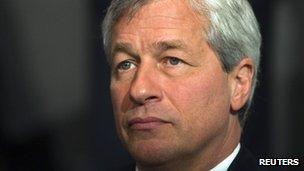JPMorgan boss Jamie Dimon admits failures
- Published

Jamie Dimon blamed "errors, sloppiness and bad judgement" for the losses
The chief executive of JPMorgan Chase, Jamie Dimon, says he was "dead wrong" in April to dismiss concerns over the bank's trading practices.
At the time he played down concerns over bets the bank made on the markets.
On Thursday JPMorgan said it had lost $2bn (£1.2bn) on trading activities in just six weeks, and said there could be further losses to come.
In a US television interview, Mr Dimon said he did not know the full extent of the problem in April.
Back then he described the concerns as a "tempest in a teapot".
Speaking on NBC's Meet the Press Mister Dimon said: "We made a terrible, egregious mistake, there's almost no excuse for it."
The bank's shares plunged by almost 10% on Friday, wiping $14bn from its value.
The losses have prompted US politicians to call for tighter financial regulation.
'Bad judgement'
The company said the losses resulted from a strategy of hedging that was supposed to protect the bank from risk.
But critics disputed his claims, alleging that such losses were more likely to have come from risky bets.
On Thursday, Mr Dimon, who serves both as chief executive and chairman of JPMorgan, blamed the losses on "errors, sloppiness and bad judgement" and warned "it could get worse".
The trading loss was <link> <caption>revealed in a regulatory filing,</caption> <url href="http://www.sec.gov/Archives/edgar/data/19617/000001961712000213/jpm-2012033110q.htm" platform="highweb"/> </link> and will dent the company's profits, although it still expects to make about $4bn this quarter.
Analysts say the firm is still in better health than many of its competitors, and the losses incurred should be manageable.
The trading was carried out by a small unit based in London.
Media reports have focused on a single trader, Frenchman Bruno Michel Iksil, nicknamed the London Whale, who reportedly made big bets on the financial markets as part of a hedging strategy.
But insiders have dismissed claims that he was a "rogue trader", saying it was the wider strategy that was at fault.
US regulators have said they are taking notice of the developments, but no inquiry has yet been officially announced.